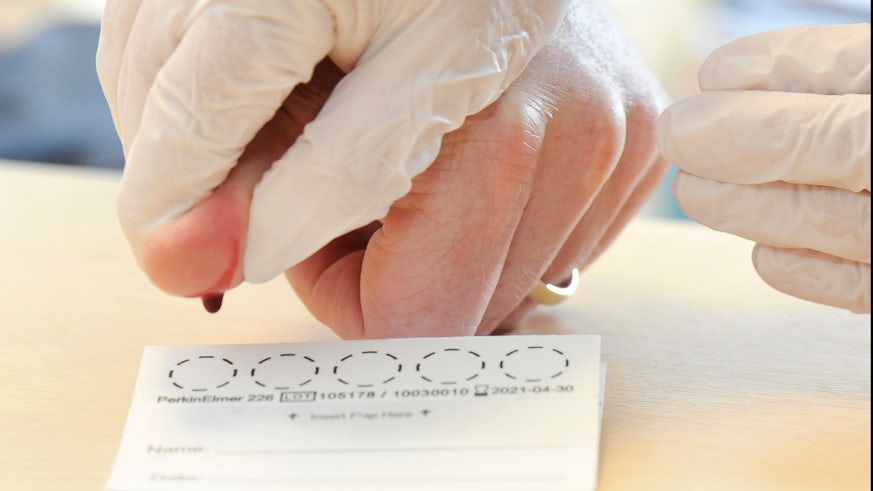New pinprick blood test for COVID-19
27 July 2020

A convenient, low-cost blood test for COVID-19 has been developed by scientists in Wales.
Dried blood spot (DBS) samples have been used since the 1960s to test newborn babies for inherited disorders.
The antibody test puts a single drop of blood from a skin prick onto specialized filter paper cards which can be sent for laboratory testing.
Experts from the University Hospital of Wales (Newborn Screening, Immunology, Point of care testing, ICU and Haematology), Cardiff University (Immunology and Clinical Innovation) and the Welsh Blood Service have now developed DBS methods for testing COVID-19 antibodies in adults.
When the DBS reaches the laboratory, a disc from the card is ‘punched out’ and the antibodies are released using a specialised liquid and the sample is then tested.
Cardiff University scientists adapted the DBS method for COVID-19 by developing an ELISA (Enzyme Linked Immunosorbent Assay) antibody test. It has been optimised for DBS specimens and translated onto an NHS automated platform in the Immunology Department at the University Hospital of Wales, enabling hundreds of DBS samples to be tested at the same time.
Professor Ian Weeks OBE, Dean of Clinical Innovation at Cardiff University’s College of Biomedical and Life Sciences said: “This approach could prove important in tackling the COVID-19 pandemic. The test only requires a finger prick sample of blood, rather like a diabetic patient checking their blood sugar levels.

No healthcare workers such as phlebotomists, nurses or doctors need to be present in order to take the blood sample, reducing the risk of possible Covid-19 transmission to or from healthcare workers, and the sample can easily be taken at home.
Alan Prosser, Director, Welsh Blood Service said: “The method does not require blood bottles or syringes, and the dried blood spot on the card is stable and flat, allowing it to be sent through the post. It will enable testing where distance presents a challenge and blood sampling resources are limited.
“If required, it can also be used by people who are shielding as part of the test, track and protect scheme, and at a large scale. The send-in approach links the testing to automated centralised laboratory platforms, which feed results directly into existing NHS pathology systems.”
Len Richards, Chief Executive of Cardiff and Vale University Health Board, added: “The DBS test is a superb example of clinical innovation – adapting existing techniques and technologies to address future challenges. It’s really beneficial in scenarios where many samples are needed – for example, when testing specific populations such as teachers, nursing home residents or groups of healthcare workers.”
The method itself is presently being further evaluated on larger numbers of samples and funding is being sought which is needed to allow the method to be scaled up and used routinely.
Share this story
The School is a major international centre for teaching and research, and committed to the pursuit of improved human health.



